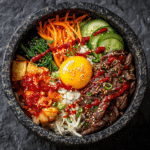Korean Bibimbap Without Sauces
Bibimbap is a classic Korean mixed rice dish topped with a variety of seasoned vegetables, a fried egg, sliced meat (optional), and spicy gochujang sauce, creating a flavorful and colorful meal.
- Prep Time: 20 mins
- Cook Time: 15 mins
- Total Time: 35 mins
- Yield: 2 servings 1x
- Category: Main Dish
- Method: Stir-Fry
- Cuisine: Korean
- Diet: Halal
Ingredients
Scale
- 2 cups cooked short-grain white rice
- 1 cup spinach, blanched and seasoned with salt
- 1 cup bean sprouts, blanched and seasoned with salt
- 1 medium carrot, julienned
- 1 small zucchini, julienned
- 1 cup shiitake mushrooms, sliced
- 200g beef sirloin, thinly sliced (optional)
- 2 large eggs
- 2 tbsp sesame oil
- 1 tbsp soy sauce
- 1 tsp garlic, minced
- 2 tbsp gochujang (Korean chili paste)
- 1 tsp sugar
- 1 tsp sesame seeds
- Salt and pepper to taste
Instructions
- Cook the rice and keep it warm.
- Prepare each vegetable separately: sauté carrots, zucchini, and mushrooms lightly in sesame oil with a pinch of salt.
- Blanch spinach and bean sprouts separately, then season with salt and sesame oil.
- If using beef, marinate with soy sauce, minced garlic, sugar, and sesame oil, then pan-fry until cooked through.
- Fry the eggs sunny-side up.
- Arrange rice in a large bowl, neatly placing vegetables and beef on top in sections.
- Place the fried egg in the center.
- Add gochujang on the side or in the middle, sprinkle with sesame seeds.
- Mix well before eating.
Notes
- For a vegetarian version, omit the beef and add extra vegetables or tofu.
- Adjust gochujang amount based on spice preference.
- Serve in a heated stone bowl (dolsot) for a crispy rice bottom.
Nutrition
- Serving Size: 1 bowl
- Calories: 550
- Sugar: 8g
- Sodium: 820mg
- Fat: 18g
- Saturated Fat: 4g
- Unsaturated Fat: 12g
- Trans Fat: 0g
- Carbohydrates: 75g
- Fiber: 6g
- Protein: 20g
- Cholesterol: 185mg
Keywords: bibimbap, korean rice bowl, mixed rice, gochujang, vegetables
Find it online: https://zesticook.com/korean-bibimbap-without-sauces/

